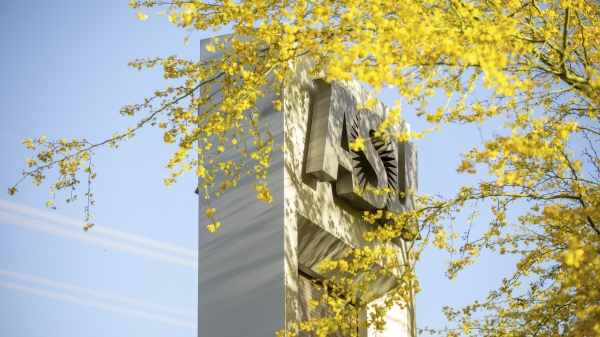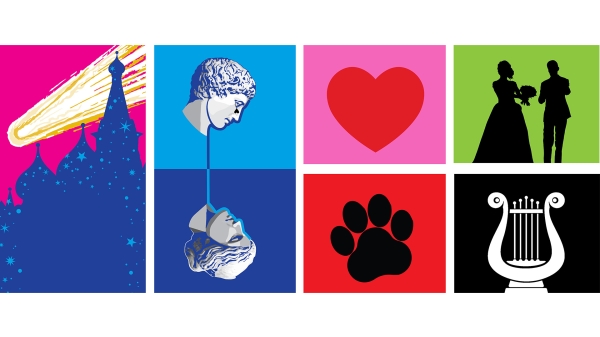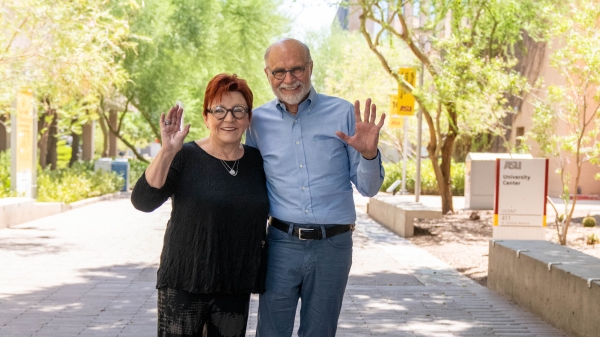ASU faculty provide a cheat sheet to French history, culture and the venues of Paris Games

The Eiffel Tower in Paris as seen from the river Seine. Photo from Pexels.com.
Did you know that each Olympic Games has a mascot? For the Paris 2024 Olympics, the mascots are little red, cone-shaped hats with big blue eyes called Les Phryges, one for the Olympics and another, with a prosthetic leg, for the Paralympics.
As part of the vision of the event, the organizing committee promised not only to make the Games a spectacle for all, but to honor the long and rich history of France. Les Phryges are named after the phrygian cap, an important symbol in French history, particularly the French Revolution.
Maroon and gold medals
ASU’s talented athletes, experts and students are heading to Paris for the XXXIII Olympiad, showcasing ASU excellence in athletic competition and soaking up hands-on learning experiences. Learn more:
“It is worn by Marianne, a woman who represents the French Republic, and its motto, ‘liberté, égalité, fraternité’ — liberty, equality, brotherhood,” said Audrey Chery, an instructor of French at the School of International Letters and Cultures at Arizona State University.
This promise to make the Games a spectacle for all and to honor French history also extends to the venues. Fans traveling to France will watch the Games at iconic and historic landmarks, including the Palace of Versailles and the Seine, the large river that runs through the center of Paris where the opening ceremony is to be held.
Brush up on some fun facts about these renowned landmarks, France and French culture ahead of the opening ceremony with faculty from the School of International Letters and Cultures.
Note: Answers have been edited for length and/or clarity.
France: The basics
Question: What should people know about the host country, France, as they watch the Olympics?
Markus Cruse, associate professor of French: France is historically and currently one of the wealthiest and most powerful countries in the world. It is the 21st-largest country by population but has the world's 11th-largest economy. France is a crucial actor in international affairs: It is a leader and co-founder of the European Union and a major contributor to NATO, the United Nations and numerous other international organizations. Because of France's former empire, French is the fifth-most-spoken language in the world. To understand the world, you have to know something about France.
Audrey Chery, instructor of French: France is a very diverse country from many standpoints, including its history, its people, its regional languages, its geography and its gastronomy. This diversity comes from its long history with many tribes, for example, the Gaulois or Ligures that have cohabited there and that have been conquered by other neighboring tribes (Romans) as well as the colonization that took place around the world, like Africa and Québec; the mix of religions; the Atlantic Ocean and Northern and Mediterranean seas that surround it; the mountains — Alps and Pyrénées, etc.; and the plains and fields. France is not just Paris.
Q: How would you describe the French as a people?
Cruse: Contrary to the stereotype, there is no single set of characteristics that describes the French. The reason for this is that French society is very diverse. The diversity is to be found, for example, in regional practices and traditions, in different ways of speaking — including different languages; French is not the only language spoken in France — in religion and in immigration. If there is one general attribute of the French, it is that they are proud of their country and their heritage.
Chery: Like anywhere, French people cannot be reduced to stereotypes. There are all kinds of French people but, compared to Americans, it takes a bit longer to form close bonds with us. We are also more direct, and we have a bit of a hierarchy in the form of a pronoun for politeness "vous." This reflects a higher power distance than in the United States.
6 venues of Paris
Q: Many of the sporting events are set to take place at famous locations throughout France. Can you provide some background about the historic and cultural significance of the venues that will be used in Paris?
The Seine — opening ceremony
Cruse: The Seine was for centuries the heart of the city. It was a commercial and transportation route full of boats and with numerous ports, and a source of drinking water and irrigation. It is still one of the world's most beautiful urban rivers.
Hôtel de Ville — athletics
Enrico Minardi, associate teaching professor of French and Italian: This has been Paris’ town hall since 1357, although the current building dates from the Renaissance (1533–1628). This is the building we see now, or, better, the copy of it — the original having been destroyed by a fire in 1871. It played an important role during the French Revolution because on this site and square in front of it, Place de Grève, began the revolt that eventually kindled the revolution in the month of June 1789. The square remained one of the iconic places of the revolution.
Grand Palais — fencing and taekwondo
Chery: Le Grand Palais was built in the 19th century for the Exposition Universelle. It was a monument dedicated to the glory of French art by the Republic. The famous architect Le Corbusier wanted it destroyed in 1960, but his death prevented this tragedy. It has been classified as a historical monument since 2008 and serves many purposes, namely as a venue for a yearly electro concert.
Stade de France — athletics and rugby sevens
Minardi: Located north of Paris in the city of Saint-Denis, it has a capacity of 80,698 people. Built in 1995–98 for the soccer World Cup — the other Parisian stadium, Parc de Prince, had room for just 48,583 spectators — it can also host different sports and various kinds of events, such as concerts. After hosting several high-profile sport events — World Cup finals of soccer and rugby, champions league’s finals, etc. — in 2024, it will also become an Olympic stadium for track and field and rugby sevens.
Invalides — archery, athletics, cycling road
Minardi: Louis XIV ordered its construction as a recovery place for his armies’ wounded and retired veterans. It represents one of the best architectural examples of French Classicism. Fallen into disgrace with the French Revolution as a symbol of royal power, Napoleon rescued the building by transforming it into a military pantheon. These days, it remains a favorite place to celebrate the French army.
Chateau de Versailles — equestrian and modern pentathlon
Cruse: Versailles was built by Louis XIV in the 17th century to house the court and government, and is one of the largest government buildings ever constructed.
3 other host cities in France
Q: Paris isn’t the only city that will host competitions. Can you tell me about some of the others?
Cruse: Lyon, a major city during the Roman era, was one of the great centers of printing in Europe during the 16th and 17th centuries, and to this day is one of the world's gastronomical capitals, with many great chefs and restaurants. Bordeaux is in the heart of one of the world's greatest wine-producing regions.
Minardi: Vieux Lyon is located at the foot of Fourvière Hill, which overlooks the whole city — very picturesque.
Chery: Landmarks of Marseille to look out for as you watch the Olympics: Le Vieux Port; Basilica Notre Dame de la Garde; the beach and calanques, a rock formation; the Mucem, the Museum of the Civilizations of Europe and the Mediterranean; the cathedral La Major.
4 things about French culture
Q: How would you describe French culture?
Cruse: French culture is one of the oldest, most sophisticated and most refined in the world. The influence of French culture on world history since the Middle Ages has been enormous. We see this influence everywhere — from architecture, literature and food to fashion, aerospace and medicine.
Q: Keeping in line with the theme of the Olympics, what is sport culture like in France?
Cruse: The French love sports and have a highly developed sports culture that embraces a wide range of sports — everything from surfing and sailing, to skydiving, mountain climbing, skiing, judo, rugby and, of course, soccer. This year, with the Olympic Games in France, it is important to remember that the Olympics were restarted in the late 1800s largely thanks to the French, and to one Frenchman in particular, Pierre de Coubertin, who believed that sports should be central to education.
Q: What are the most popular sports in France, both to play and to watch?
Cruse: Soccer, which they call "football" like much of the rest of the world. The French national team has won the World Cup twice.
Minardi: Soccer, rugby and judo.
Q: What are some staple food and drinks in France?
Chery: Some staple foods are pâté lorraine, quiche lorraine, crêpe à la confiture and choucroute. I personally just love to eat a good baguette with one of the 3,000 or so different cheeses we have, such as la fourme d'Ambert, le Saint-Marcellin, le comté or le muenster. Staple drinks are wine — red, white, rosé — sparkling water and espresso, to name a few.
8 fun French phrases
Q: What are some fun slang phrases or colloquial expressions to know?
Minardi:
- Ça va?: How are you?
- Super!
- Ouais: Yes! (A more informal version of "oui.")
- Tu kiffes?: Do you like?
Chery:
- En vrai: In truth/truthfully.
- Du coup: Therefore, or used as a filler word in many different contexts.
- Voilà: Exclamation for "here you go" or to show someone something.
Cruse: One of my favorites is "avoir d'autres chats à fouetter," which is an idiom. It literally means "to have other cats to whip," but is used to mean "to have better things to do" or "to have more important business."
Bonus: 3 facts about the ancient Olympics
Read on for trivia about the ancient Olympics from Sarah Bolmarcich, an associate teaching professor of classics at the School of International Letters and Cultures. Bolmarcich is teaching a new course on the ancient Olympics in the fall.
Q: What were the main sports in the ancient Olympics?
A: The earliest event at the ancient Olympics was the stadion, a 200-meter sprint. Others included boxing, chariot racing, wrestling, archery and the ancient pentathlon, which is different from the modern pentathlon in that it was entirely track and field events. There were even musical competitions for trumpet players.
One competition not used in the modern Olympics was the pankration, which means "all power" in Greek. Two unarmed combatants fought using any technique they could. There were only two rules: You could not bite your opponent, and you could not gouge out their eyes. Killing them was not against the rules.
Q: What prizes did Olympic victors get?
A: The big prize for the ancient Olympics was a wreath of olive leaves, because the Greeks believed the real prize to be honor. But when victors returned home to their cities, they were often greeted with festivities, songs and poems in their honor and, in Athens at least, they and their descendants were fed at state expense for the rest of their lives.
Q: Are there any popular misconceptions about ancient Olympics you would like to address?
A: There is this idea of the ancient Olympians as paragons of athletic virtue, amateurs who wouldn't cheat. This is just not true. Usually the athletes were supported by stipends from their home cities. And while there weren't cash rewards at the ancient Olympics, there were for other Greek athletic contests. The Greeks didn't even have a word for amateur. And the athletes definitely cheated — they bribed opponents to throw matches, and they used herbs and other items in hopes of boosting their performances. A favorite supposed performance enhancer was to eat raw animal testicles.
More Arts, humanities and education

ASU researchers awarded $1M grant to cultivate civic virtues in Arizona public universities
Principled Innovation is the backbone behind a recent $1 million dollar grant award to a team of Arizona State University researchers for their project, Cultivating Civic Virtues Through Action.…

ASU Music Theatre and Opera season spotlights composers, students and masterworks
The 2024–25 ASU Music Theatre and Opera season features projects that illuminate contemporary composers and writers, student-led work, and iconic masterworks that push the boundaries of opera…

Arizona couple donate $10M to Arizona PBS, the largest gift in the station's history
Sue Hart-Wadley and Searle Wadley have always loved PBS for its educational, entertaining and inspirational programming. After years of learning from its variety of offerings, the Arizona couple are…